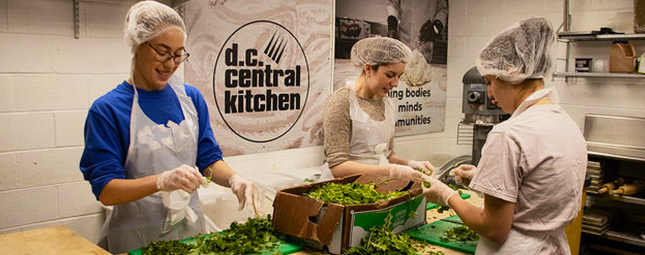Maximizing impact through food with DC Central Kitchen

It’s clear that an organization is doing pioneering work in the food system when the President and the Vice President come to participate, as occurred at DC Central Kitchen (DCCK) just before Thanksgiving.
And we agree.
Leanpath has been proud to partner with DCCK for the past three years through our Leanpath 12.3 initiative, supporting the organization’s transformative work to address hunger and poverty through job training and job creation since its founding by Robert Egger over 30 years ago (read more about DCCK’s history here).
We’re united by powerful, complementary, and systemic change-focused missions around food.
At Leanpath we believe that food connects everything. That theme is evident at DC Central Kitchen, too, and makes for strong alignment. DCCK’s mission is to use food as a tool to strengthen bodies, empower minds, and build communities – with hunger viewed as a symptom of the systemic issue of poverty. Leanpath’s mission is to make food waste prevention everyday practice in the world’s kitchens – we address the systemic challenge of excessive food waste (and the associated environmental and social harm) with innovative tools to prevent waste from occurring. Through our partnership, we are leveraging the transformative power of food together.
We’re also aligned on the importance of building community through our work, both locally and globally. DCCK believes that all individuals deserve the opportunity to share in the dignity of work while contributing to their community – which they achieve through their culinary job training program. Similarly, Leanpath connects frontline foodservice workers to the food waste challenge, helping them see their ability to reduce waste in operations in line with our vision of ensuring a sustainable future for all by eliminating global food waste.
Further, we’re aligned on the importance of eliminating food waste. DCCK plays a key role in pulling excess food resources out of the food system, preventing them from going to waste and putting them to productive use. Quite simply, DCCK believes that the waste of nutritious food is wrong, which aligns with a core Leanpath value that environmental stewardship is our responsibility (and that we help to create a more resilient planet by reducing waste and educating stakeholders). Together, we are making more efficient foodservice operations and reducing environmental impact by creating a culture of food waste reduction.
DCCK also recognizes the value of measurement in driving waste reduction and behavior change, and the insights that come from tracking food waste in automated fashion with Leanpath’s technology, especially at this time of food system disruption. As Amy Bachman, Director of Procurement and Sustainability at DCCK, notes, “Like everyone in the foodservice industry, DC Central Kitchen has experienced a lot of supply chain challenges and increased food costs this year. Our Leanpath trackers help to keep our team cognizant of any waste we are incurring as it’s even more important now to utilize our products to their fullest and minimize any waste since products cannot always be re-ordered easily due to supply chain issues.“
With a keen focus on product maximization, DCCK has tracked over 1,200 transactions with Leanpath this year between two locations. One tracker is located in the Nutrition Lab, where thousands of meals are prepared daily for 18 schools in the District of Columbia. A second mobile tracker is used in the DC Central Kitchen Café on the campus of THEARC, which serves locally-sourced meals for community members while providing culinary job training and career development for staff members.
The tracking process is providing valuable insight into food items that most often go to waste, as well as the most frequent reasons for the waste (such as inventory spoilage, overproduction, and trimmings) along with the sources of the waste. For example, review of wasted inventory details pointed to an opportunity with fruits and vegetables, prompting the team to review pack sizes and switch to ordering smaller cases to reduce waste from excess inventory, Bachman noted.
Citing the Café’s role as a training site for DCCK’s Culinary Job Training program, Bachman added that “having the tracker there allows our students to be exposed and trained in the tenets of waste tracking, ensuring that the focus on reducing waste is an integral part of their culinary training from the start.” Significantly, the students can bring that waste reduction focus to future roles.
Team members can view the disposition of such food, and a review of specific transactions enabled the diversion of more inedible food waste to compost – a better alternative to trash. They can also drill into data and images in myriad ways for additional unique insights to reduce waste or coach for operational changes. Further, they can view the amount of avoided food waste over time (compared to a baseline level) and the associated environmental savings to assess impact.
From culinary job training to healthy school food initiatives, the Healthy Corners program, community meal preparation and more, DC Central Kitchen is truly fighting hunger differently with a transformative, root-cause focus. And at Leanpath, we’re fighting food waste differently with a focus on preventing it from occurring in the first place.
Together, we are working to maximize our impact, building sustainable communities and a sustainable world through the power of food, because food connects everything.
